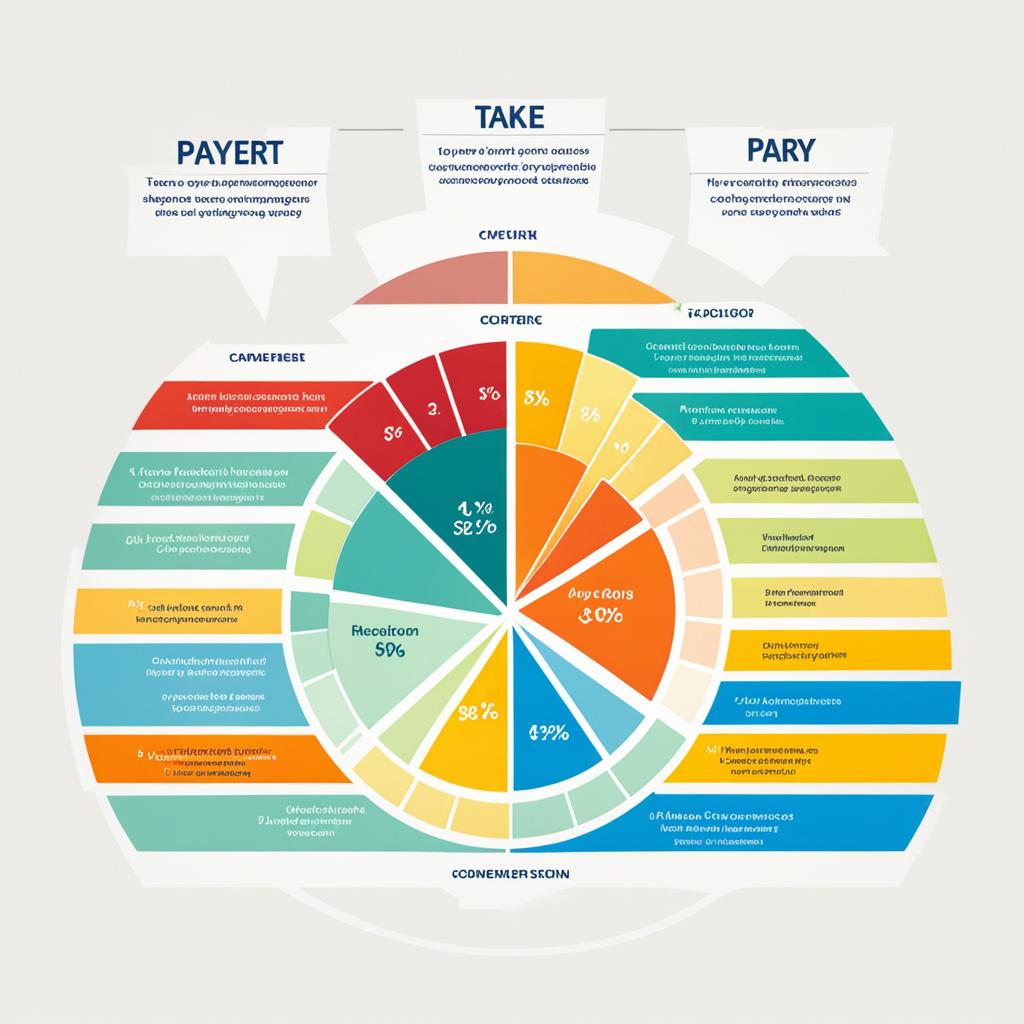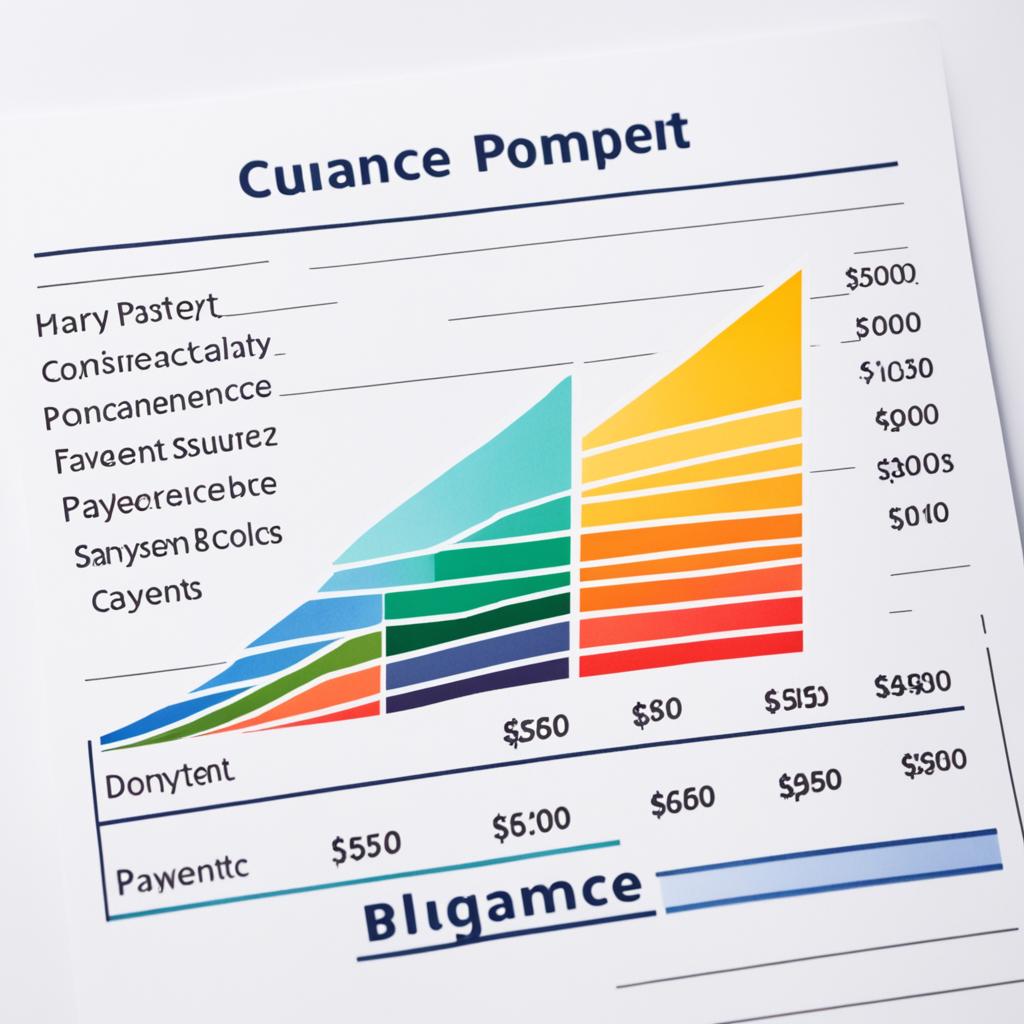Greetings! If you’re wondering how much you should spend on a car, you’ve come to the right place. Setting a car budget is an important step in the car buying process, helping you determine the affordable car price range and ensure a financially responsible purchase. I’m here to guide you through the process and provide valuable tips for determining your car purchasing budget.
When it comes to budgeting for a car, it’s crucial to consider various factors, including your income, expenses, and the overall vehicle cost calculation. By taking a thoughtful approach to car affordability, you can make a well-informed decision that aligns with your financial goals.
Key Takeaways:
- Setting a car budget is essential to ensure a financially responsible purchase.
- Consider your income and expenses when determining how much you can afford to spend on a car.
- Beyond the sales price, budget for additional expenses like repairs, registration, and insurance.
- Financial planning is crucial for making an informed decision and staying within your car purchasing budget.
- Remember to prioritize affordability and align your car budget with your overall financial goals.
How to Calculate How Much You Can Afford to Spend on a Car
When thinking about what you should spend on a vehicle, keep in mind that the purchase price is only one part of your expenses. To make sure you can comfortably afford the car you want, you need to take into account several factors:
- Income: Your income plays a crucial role in determining your car budget. As a general rule, transportation expenses, including the car payment, should not exceed 10% of your monthly income.
- Existing Debt: Consider any existing debts you have, such as student loans or credit card payments. You don’t want your car expenses to strain your budget, so it’s important to factor in your debt obligations.
- Financing Options: Explore the different financing options available to you, such as loans from banks or credit unions. Compare interest rates and terms to find the most suitable option for your budget.
- Taxes and Fees: Don’t forget to include taxes and fees in your calculations. These can vary depending on your location, so research the applicable rates and add them to your budget.
- Car Insurance Premiums: Car insurance is a necessary expense for car owners. Research and get quotes from different insurance providers to estimate the monthly premium and include it in your budget.
- Maintenance and Fuel Costs: Cars require regular maintenance, such as oil changes and tire rotations, as well as fuel for daily use. Consider these ongoing expenses when determining your budget.
Taking all these factors into account will give you a more accurate picture of how much car you can afford. It’s important to set a realistic budget that aligns with your financial situation and goals. By doing so, you can enjoy your new car without putting unnecessary strain on your finances.
“Your budget should not only focus on the purchase price of the car, but also consider factors like income, existing debt, financing options, taxes and fees, car insurance premiums, maintenance fees, and fuel costs.”
Determining Your Budget
When it comes to buying a car, determining your budget is a crucial first step. Your budget will depend on various factors, including your income, debt, and the expenses associated with car ownership. Let’s explore how these factors can help you establish a realistic budget for buying a car.
Income as a Car Budgeting Factor
Your income plays a significant role in determining how much you can allocate towards transportation expenses. Generally, financial experts recommend keeping your car-related expenses, including the car payment, insurance, and fuel, within 10-15% of your monthly income. By aligning your budget with your income, you can ensure that your car expenses do not put excessive strain on your finances.
Debt-to-Income Ratio and Loan Approval Process
When applying for a car loan, lenders consider your debt-to-income ratio (DTI) to assess your ability to manage additional debt. Your DTI is calculated by dividing your total debt payments by your monthly income. To increase your chances of loan approval, it’s generally recommended to keep your DTI below 40%. Maintaining a low DTI demonstrates to lenders that you have enough disposable income to comfortably afford a car loan.
Credit Score Impact on Interest Rate and Loan Terms
Your credit score plays a crucial role in determining the interest rate you will qualify for on a car loan. A higher credit score generally translates to a lower interest rate, potentially saving you thousands of dollars over the life of the loan. Additionally, your credit score can also affect the loan term offered to you. A higher credit score may allow for more favorable loan terms, such as lower monthly payments or a shorter repayment period.
Calculating Taxes and Fees
When budgeting for a car purchase, it’s essential to consider the various taxes and fees associated with the transaction. These may include sales tax, registration fees, tag and title fees, and documentation fees. These charges can vary depending on your location and the specific details of the car you are purchasing. It’s important to factor in these costs to avoid any surprises and ensure that your budget accurately reflects the total expenses of buying a car.
Estimating Insurance Premiums, Maintenance Costs, and Fuel Expenses
Car ownership involves additional expenses beyond the initial purchase. It’s important to consider factors such as car insurance premiums, maintenance fees, and fuel expenses when determining your budget. Insurance premiums can vary based on factors such as your age, driving record, and the type of car you drive. Maintenance costs can include regular servicing, repairs, and the replacement of wear and tear items. Finally, fuel expenses will depend on the car’s fuel efficiency and your driving habits. By estimating these ongoing expenses, you can better manage your overall car budget.
By considering your income, debt-to-income ratio, credit score, taxes and fees, and ongoing expenses like insurance premiums, maintenance costs, and fuel expenses, you can determine a budget that aligns with your financial situation. Taking these factors into account ensures that you can comfortably afford the car you desire without jeopardizing your financial stability.
Buying a Car
Once you have determined your budget, you can start the process of buying a car. It’s an exciting journey that requires careful consideration and research. To make the most out of your car-buying experience, here are some essential steps to follow:
Negotiating the Best Price
When purchasing a car, negotiation is key. Don’t be afraid to haggle with the dealer to secure the best price possible. Be prepared to walk away if the terms are not favorable. Remember, the power is in your hands as the buyer.
Financing Options
Securing financing ahead of time can help streamline the car-buying process. Explore different lenders and compare auto loan interest rates to find the best deal that suits your budget. Check out online resources and local financial institutions for competitive rates.
Comparing Auto Loans
Not all auto loans are created equal. Take the time to compare different lenders to find the loan that aligns with your financial goals. Consider factors such as interest rates, loan terms, and repayment plans. Shop around for the best loan option that fits your needs.
Calculating Additional Costs
Buying a car involves more than just the sticker price. Calculate additional costs such as sales tax, registration fees, tag and title fees, and documentation fees. Having a clear understanding of these expenses will help you budget effectively and avoid any surprises.
Finding the Best Car Insurance Rates
Car insurance is a mandatory requirement for owning a vehicle. Research and compare different insurance providers to find the best rates and coverage options. Consider factors like deductibles, coverage limits, and customer reviews to make an informed decision.
Car Maintenance and Fuel Efficiency Tips
Once you’ve purchased your car, it’s important to maintain it properly to ensure its longevity and optimal performance. Follow recommended maintenance schedules, such as regular oil changes and tire rotations. Additionally, adopting fuel efficiency tips can help save you money at the pump and minimize your environmental impact.
By keeping these steps in mind, you can navigate the car-buying process with confidence and make informed decisions. Remember to stay within your budget and prioritize your needs and preferences when selecting a car that suits your lifestyle.
How Much of My Salary Should I Spend on a Car?
When it comes to determining how much of your salary you should allocate for a car, it’s important to follow some guidelines to ensure that your car expenses are within a reasonable budget. One popular rule to keep in mind is the 20/4/10 rule, which provides a framework for calculating transportation expenses based on your salary, down payment percentage, and loan term length.
The 20/4/10 rule suggests that you should limit your transportation expenses to 10% of your salary. This includes not only the car payment, but also insurance, fuel, and other fees associated with car ownership. By following this rule, you can ensure that your car expenses don’t exceed an affordable portion of your income.
Additionally, the 20/4/10 rule recommends making a down payment of at least 20% of the car’s purchase price. This not only helps reduce the amount financed but also lowers the monthly payment. It’s important to consider your financial situation and determine an appropriate down payment based on your budget and preferences.
When considering a loan, it’s also advised to aim for a loan term length of no more than four years. Longer loan terms may result in lower monthly payments but can also lead to higher interest costs over time. By keeping the loan term shorter, you can potentially save on interest and pay off the loan faster.
To get a better understanding of how these guidelines translate into real-world figures, take a look at the table below:
The table above showcases various salary ranges and the corresponding recommended transportation expenses based on the 20/4/10 rule. It provides an estimate of how much you can afford to spend on a car payment, insurance, fuel, and other fees while staying within a reasonable budget.
Keep in mind that the 20/4/10 rule is a general guideline and may need to be adjusted based on your individual financial situation. It’s always a good idea to carefully evaluate your income, expenses, and debt-to-income ratio when determining how much of your salary you should allocate for a car.
How Much Should I Spend on a Car If I Make $100,000?
If you have a $100,000 annual income, it’s important to allocate your budget wisely when it comes to buying a car. Following the 20/4/10 rule, which advises capping transportation expenses at 10% of your income, can help ensure that you maintain a healthy balance between your car expenses and overall financial stability.
Let’s break down the numbers to get a better understanding of how your car budget might look like:
| Expense Category | Monthly Cost |
|---|---|
| Car Payment | $328 |
| Insurance Premium | $147 |
| Fuel Expenses | $260 |
| Maintenance Fees | $95.50 |
These expenses add up to a total of approximately $833 per month, which aligns with the recommended transportation expenses cap for your income level. By budgeting accordingly, you can ensure that your car-related expenses fit comfortably within your existing financial framework.
Remember, these figures are just an example, and your actual car budget may vary based on factors like the type of car you choose, insurance rates, fuel efficiency, and maintenance requirements. However, using this breakdown as a starting point can provide you with a practical guideline for managing your car expenses effectively.
When determining how much to spend on a car, it’s essential to consider not only the price of the vehicle itself but also the costs associated with ownership, such as insurance, fuel, and maintenance fees. By carefully evaluating your budget and financial situation, you can make a responsible decision that aligns with your income and overall financial goals.

References:
- 20/4/10 rule: https://www.kbb.com/car-advice/car-ownership/20-4-10-rule/
When Should You Buy a Car Financially?
While conventional wisdom suggests that the best time to buy a car is at the end of the month or end of the year when dealerships are trying to meet quotas, the best time to buy a car financially depends on your individual needs and priorities. Consider your financial situation and goals when determining the optimal timing for a car purchase.
Car buying timing is a crucial factor in ensuring you get the best deal possible. End of month car deals and end of year car deals are often promoted as ideal times to purchase a car because dealerships are more motivated to make sales and may offer discounts and incentives. However, these general guidelines may not always align with your personal financial situation.
It’s important to assess your financial situation and determine whether it’s the right time for a car purchase. Take into account factors such as your current income, savings, and overall budget. If you’re in a stable financial position with enough savings and a good credit score, you may have more flexibility in choosing when to buy a car.
Furthermore, consider your personal financial goals and priorities. Are you saving for a down payment on a house or planning to make a major investment in the near future? These factors may influence your decision to purchase a car at a specific time.
Factors to Consider When Timing Your Car Purchase
- Your overall financial situation and stability
- The availability of end of month car deals and end of year car deals
- Your personal financial goals and priorities
- The state of the used car market and current prices
- The model year and availability of new releases
- The timing of major auto shows and industry events
Ultimately, the best time to buy a car financially is determined by your unique circumstances. Take the time to evaluate your financial situation, goals, and the current market conditions before making a decision. Choosing the right timing for your car purchase can help ensure that it aligns with both your financial capabilities and long-term objectives.
The Bottom Line
When determining how much to spend on a car, it’s crucial to consider various factors that go beyond just the price tag. To make a financially responsible decision, it’s important to account for the total cost of car ownership, including insurance premiums, maintenance expenses, and fuel costs. Additionally, understanding the importance of making a down payment and securing a loan with a favorable interest rate can significantly impact the overall cost of owning a car.
Car Affordability Factors
Car affordability is influenced by several key factors. These include the total cost of car ownership, which involves expenses like insurance premiums, maintenance expenses, and fuel costs. By considering these factors, you can determine the true affordability of a car beyond its initial purchase price.
Down Payment Importance
Making a substantial down payment can have a significant impact on your car budget. A larger down payment reduces the loan amount, leading to lower monthly payments and less interest paid over the life of the loan. By saving up for a down payment, you can increase your purchasing power and make your car more affordable in the long run.
Interest Rate Impact on Repayment Costs
The interest rate on your car loan directly affects your repayment costs. A higher interest rate means you’ll pay more in interest over the loan term, increasing the total cost of ownership. Securing a loan with a favorable interest rate can help minimize the financial burden of car ownership.
Insurance Premiums
Insurance is a necessary expense when owning a car. The cost of insurance premiums varies based on factors like the type of car, your driving history, and your location. Before buying a car, it’s essential to consider the potential insurance premiums and include them in your overall budget.
Maintenance Expenses
Maintenance is an ongoing cost of car ownership. Regular maintenance, such as oil changes, tire rotations, and inspections, helps keep your car running smoothly and can prevent costly repairs down the line. Budgeting for maintenance expenses ensures that you can properly care for your car without straining your finances.
Fuel Costs
Fuel costs are another significant expense to consider when budgeting for a car. The fuel efficiency of the vehicle and the distance you typically drive can impact how much you spend on fuel each month. Understanding these costs can help you determine the overall affordability of a car.
| Expense | Estimated Monthly Cost |
|---|---|
| Insurance Premiums | $150 |
| Maintenance Expenses | $100 |
| Fuel Costs | $200 |
| Total | $450 |
Car Budgeting Summary
When budgeting for a car purchase, it’s vital to consider all the relevant factors discussed above. By taking into account the total cost of car ownership, making a down payment, securing a favorable loan interest rate, and factoring in insurance premiums, maintenance expenses, and fuel costs, you can make an informed and responsible decision that aligns with your financial situation.
Car Affordability Calculator
When determining how much you can comfortably afford to spend on a car, it’s essential to have a clear understanding of your borrowing capacity. A car affordability calculator can help you evaluate your financial details and make an informed decision. By entering information such as your monthly income, expenses, down payment amount, loan duration, interest rate, and trade-in value, you can obtain an estimate of your borrowing capacity.
Once you input all the necessary financial details, the car affordability calculator will provide you with valuable insights. It will take into account factors such as your income, expenses, and trade-in value to determine your estimated borrowing capacity. Additionally, it will calculate your target purchase price based on your financial situation.
Loan duration is an essential consideration when using the affordability calculator. The calculator will show how the length of your loan impacts your borrowing capacity. Generally, a longer loan duration may result in a higher borrowing capacity but may also mean paying more interest over time. On the other hand, a shorter loan term may limit your borrowing capacity but help you save on interest expenses.
It’s also important to consider any trade-in value you might have for your current car. Including this value in the calculation can offset the cost of your new car and potentially increase your borrowing capacity. Take into account the current fair market value of your vehicle to get a more accurate estimate.
Once you receive the results from the car affordability calculator, it’s vital to interpret them correctly. Evaluate the estimated borrowing capacity and target purchase price to determine if they align with your financial goals and budget. Keep in mind that affordability is a subjective measure, and it’s crucial to make a decision that fits your financial situation comfortably.
Here’s an example of how the car affordability calculator results might look:
Establishing Your Monthly Car Budget
Creating a feasible monthly car budget is crucial when planning to purchase a car. To effectively determine your budget, you need to evaluate your net income and deduct your recurring expenses. This evaluation allows you to allocate an appropriate amount towards your car payment while considering your overall financial well-being.
Evaluating your net income involves understanding the amount of money you have available after taxes and other deductions. By deducting your recurring expenses, such as rent or mortgage payments, utility bills, and groceries, you can determine the surplus income that can be allocated towards your car budget.
Creating a Realistic Budget
It’s essential to establish a realistic car budget to prevent financial strain and ensure long-term financial stability. Allocating too much of your income towards a car payment can lead to difficulties in meeting other essential expenses and limit your ability to build wealth.
When setting a realistic budget, consider factors such as your overall financial goals, saving capabilities, and other financial obligations. By incorporating all of these considerations, you can have a clear understanding of how much you can comfortably allocate towards your car payment without jeopardizing your financial well-being.
The Importance of a Realistic Budget
“Without a realistic budget, you may find yourself facing financial difficulties, struggling to meet other important expenses, or even falling into debt. It’s crucial to establish a budget that aligns with your financial situation and priorities.”
By having a realistic budget in place, you can prevent financial strain and ensure that you have enough funds to cover other important expenses and savings goals. Additionally, a realistic budget allows you to allocate your wealth effectively, ensuring you are putting money towards your long-term financial objectives.
Consequences of Ignoring Realistic Budgeting
“Failing to set a realistic budget can lead to overspending, neglecting other important expenses, and limiting your ability to plan for the future. It’s important to consider all financial aspects and responsibilities before finalizing your car budget.”
If you ignore the importance of a realistic budget, you may risk overspending on your car payment. This can result in neglecting other essential expenses, such as rent, utilities, or even saving for emergencies or retirement. Without a well-thought-out and balanced budget, you may find yourself facing financial consequences that hinder your overall financial stability and limit your ability to achieve your long-term financial goals.
Guidelines for Car Budgeting
When establishing your car budget, it’s helpful to follow some guidelines to ensure affordability and financial well-being. Consider the following car budgeting tips:
- Evaluate your net income and deduct recurring expenses to determine available funds for a car payment.
- Aim for a car payment that does not exceed a certain percentage of your monthly net income, such as 10% or 15%.
- Account for other car-related expenses like insurance, maintenance, and fuel costs.
- Consider the potential impact of interest rates and loan terms on your car payment affordability.
- Ensure your car budget aligns with your overall financial goals and obligations.
Following these guidelines can help you establish a car budget that fits within your financial means, ultimately preventing financial strain and ensuring long-term financial stability.
| Expense Category | Percentage Allocation |
|---|---|
| Car Payment | 15% |
| Car Insurance | 10% |
| Maintenance and Repairs | 5% |
| Fuel | 5% |
| Total | 35% |
Recommended Percentage of Take-Home Pay
When it comes to budgeting for your car, it’s important to consider recommended guidelines based on your take-home pay. Financial experts suggest allocating 10-15% of your monthly income towards your car payment and no more than 20% for total car ownership costs. Adhering to these recommendations ensures that your car expenses are in line with your budget and overall financial situation.
Factors such as your credit score, interest rate, loan term, and debt-to-income ratio can all have an impact on your car budgeting decisions. By understanding how these elements influence your car financing options, you can make informed choices that align with your financial goals.
Affordability Guidelines
- Allocate 10-15% of your monthly take-home pay for your car payment
- Limit total car ownership costs to no more than 20% of your monthly income
- Consider your credit score, as it affects the interest rate you qualify for
- Choose a loan term that balances manageable monthly payments with interest payment savings
- Take your debt-to-income ratio into account when budgeting for your car
By following these affordability guidelines, you can ensure that your car expenses remain within a reasonable range of your income. This allows you to comfortably afford your monthly payments while still maintaining financial stability.
“Allocating a percentage of your take-home pay towards your car payment and total ownership costs helps prevent financial strain and ensures a responsible approach to car budgeting.”
When planning your car budget, keep in mind that the recommended percentages are flexible and serve as general guidelines. Your individual financial situation may require adjustments to better suit your needs and goals. It’s important to carefully evaluate your budget and make decisions that align with your overall financial plan.
Remember, establishing a budget that aligns with your income and financial goals is crucial for responsible car buying. By staying within the recommended range and considering important factors like credit score, interest rate, loan term, and debt-to-income ratio, you can confidently navigate the car ownership journey while maintaining financial stability.

| Car Expense | Percentage of Monthly Take-Home Pay |
|---|---|
| Car Payment | 10-15% |
| Total Ownership Costs (including insurance, fuel, maintenance, etc.) | Not more than 20% |
Evaluating Total Car Ownership Costs
When considering the affordability of a car, it’s crucial to take into account all aspects of total ownership costs. This includes not only the purchase price but also ongoing expenses such as maintenance and repair costs. These expenses can vary depending on factors such as the age and model of the car.
“Owning a car means taking responsibility for its maintenance and repair costs, which can add up over time. It’s important to budget for these expenses to ensure that they do not strain your finances.”
Maintenance costs tend to increase as a car gets older. Older vehicles may require more frequent repairs, and replacement parts may be harder to find or more expensive. Luxury cars, in particular, often have higher maintenance costs due to their advanced features and specialized components.
Additionally, insurance premiums should be factored in when evaluating car ownership costs. The cost of insuring a car can vary based on factors such as the driver’s age, location, driving history, and the car’s value. It’s advisable to estimate insurance premiums to determine their impact on your budget.
Fuel expenses are another significant consideration. The fuel efficiency of a car can greatly affect the amount spent on gas over time. If you’re evaluating multiple car options, comparing their fuel efficiency ratings can help you estimate potential fuel expenses.
Registration fees and sales tax are also important to consider. These costs can vary based on state and local regulations and the purchase price of the car. By calculating these expenses, you can better understand the total cost of owning a car.
When evaluating the affordability of a car, it’s crucial to calculate the total ownership costs, including maintenance and repair expenses, insurance premiums, fuel expenses, and registration fees. By considering all these factors, you can make an informed decision on which car fits within your budget and avoid any unexpected financial burdens.
| Expense Category | Considerations |
|---|---|
| Maintenance and Repair Expenses | Vary based on car age and model |
| Insurance Premiums | Factor in location, driver profile, and car value |
| Fuel Expenses | Influenced by the car’s fuel efficiency |
| Registration Fees and Sales Tax | Vary based on state and local regulations, as well as the car’s purchase price |
Considering these factors will give you a comprehensive understanding of the total cost of owning a car and help you make a well-informed decision that aligns with your financial situation.
Conclusion
In conclusion, determining how much to spend on a car requires careful consideration of several financial factors. It is crucial to take into account your income, expenses, and total ownership costs when setting a car budget. By evaluating your financial situation thoroughly, you can make a responsible and informed decision when purchasing a car.
When budgeting for a car, it is important to prioritize affordability and consider all aspects of car ownership. Remember to account for expenses such as insurance premiums, maintenance fees, and fuel costs, in addition to the purchase price. By following budgeting guidelines and considering your financial limitations, you can ensure a financially responsible car buying experience.
In summary, responsible car buying involves careful evaluation of your financial considerations. Take into account your income, expenses, and total ownership costs, and use budgeting guidelines to set a realistic car budget. By doing so, you will be able to make an informed decision and purchase a car that aligns with your financial situation and goals.
FAQ
How do I calculate how much I can afford to spend on a car?
How do I determine my budget for buying a car?
What should I keep in mind when buying a car?
How much of my salary should I spend on a car?
How much should I spend on a car if I make 0,000?
When is the best time to buy a car financially?
What factors should I consider when evaluating car affordability?
How can I use a car affordability calculator?
How do I establish a monthly car budget?
What percentage of my take-home pay should I spend on a car?
How do I evaluate total car ownership costs?
Source Links
- https://www.investopedia.com/how-much-should-i-spend-on-a-car-5187853
- https://www.moneyunder30.com/car-affordability-calculator/
- https://www.ramseysolutions.com/saving/how-much-car-can-i-afford
Money posts:
 Apply for Car Loan: Easy Steps to Your Dream Car (2024)
Apply for Car Loan: Easy Steps to Your Dream Car (2024)
 Secured Loan with a Financed Car: How-To Guide (2024)
Secured Loan with a Financed Car: How-To Guide (2024)
 Car Title Loans Online: Fast Cash or Fast Trouble? (2024)
Car Title Loans Online: Fast Cash or Fast Trouble? (2024)
 How DoorDash, Instacart, & More are Helping With Surging Gas Prices in 2024
How DoorDash, Instacart, & More are Helping With Surging Gas Prices in 2024
 Best Egg Loan: Cracking The Code to Easy Loans (2024)
Best Egg Loan: Cracking The Code to Easy Loans (2024)
 Home Improvement Loans: Renovate Your Dream Home (2024)
Home Improvement Loans: Renovate Your Dream Home (2024)
 Emergency Same Day Loans: A Lifesaver or Trap? (2024)
Emergency Same Day Loans: A Lifesaver or Trap? (2024)
 FHA Loans: Your Ticket to Homeownership (2024)
FHA Loans: Your Ticket to Homeownership (2024)

